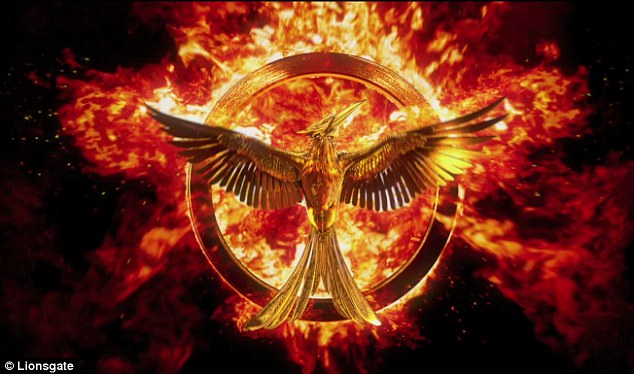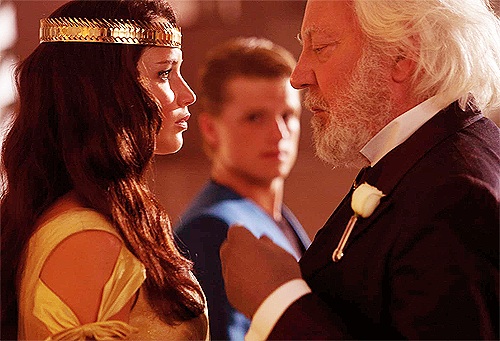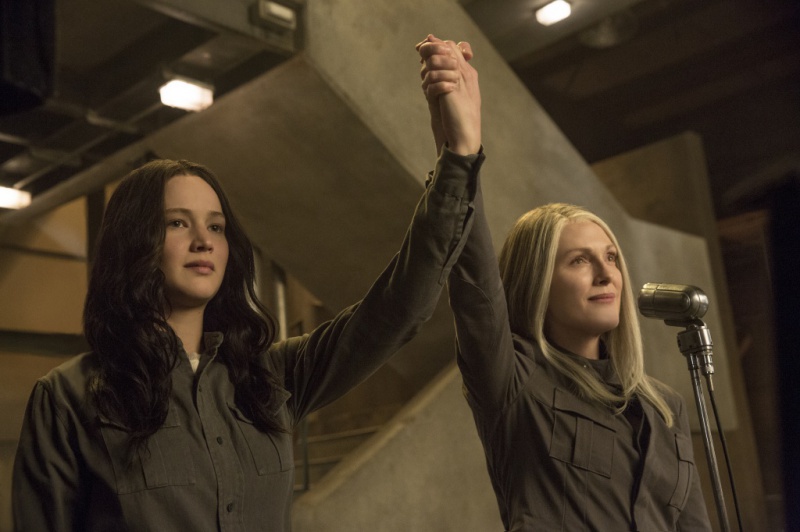Last weekend, The Hunger Games: Mockingjay – Part 2 made over $100 million at the box office. The movie’s success is largely due to the strength of Jennifer Lawrence and the popularity of the books. Enough digital ink has been spilled discussing the movie as a dystopian political outlook for young adult audiences. Instead, here we repurpose the world of Panem as if it adopted the intellectual property laws currently in the United States.
Accordingly, under that hypothetical, what trademark and publicity rights does Katniss Everdeen have? Did the rebels and/or the nation-state of Panem violate or infringe any of these rights by exploiting her image as the “Mockingjay”?
[mild spoilers ahead, proceed with caution if you have not seen the movie]
For those that have not read the books or seen the movie, Katniss Everdeen is a teenage girl from a poor rural area of what is known as “District 12” in the country of Panem. Panem is the government that exists in North America after the United States, Mexico and Canada ceased to be. District 12 is believed to be geographically located in an area that used to be West Virginia, most notable for the coal mining in the area as the prime source of employment for residents. As part of a brutal rebellion and thwarted civil war, the districts are required to send children to a “Hunger Games” each year as penance to the Capitol and a reminder of the dark days. Katniss’ sister was randomly selected for the Games one year… triggering a series of events whereby Katniss volunteered to take the place of her sister in the Games, becoming a “victor” in those Games, and eventually becoming the face of the rebel army that overthrew the Capitol’s regime. The key fact is that Katniss the individual went from an unknown girl to the “Mockingjay” – the most famous person in Panem and a symbol for revolution and a potential pawn in the replacement government’s scheme.
What rights does Katniss have?
Misappropriation of Name and Likeness
As a private individual, Katniss should be able to claim rights to her name and likeness or image. These rights are misappropriated when someone else uses your name or likeness for his benefit, such as for an advertisement or commercial.[1] Under Texas law,[2] to prove a case for misappropriation, Katniss would need to demonstrate that her name or likeness was being used without authorization for some form of advantage (usually commercial). She would not, however, need to prove that anyone actually made money from her image.[3] Katniss could even seek to claim damages from mental anguish and any actual pecuniary losses she may have suffered.[4]
Rights of Publicity
In Texas, the laws governing the rights of publicity are colloquially known as the “Buddy Holly” law. It is codified by the Texas Property Code.[5] The Elvis Presley estate sought to apply this law and later had a court declare that there is an “inherent right of every human being to control the commercial use of his or her identity.”[6] Upon registration by the estate, these publicity rights expire fifty years after an individual dies. After a person dies, the scope of their rights become limited, and use of their likeness can be used without permission for any “material that is primarily of political or newsworthy value.”[7]
What is worth noting is that these rights can be transferred by contract or similar document prior to a person’s death. After the person dies, it can be transferred through a trust or estate.[8] There does not appear to be a requirement that the transfer of publicity rights be in writing.
Trademarks
Does Katniss have any trademark rights? Prior to the Games she was not famous. After the Games she was likely the most famous person in all of Panem. Her public profile changed substantially. By that point she certainly could claim value in the name “Katniss” and could prevent others from falsely using her name or image to sell products, right? Section 43(a) of the Lanham Act precludes the following:
Any person who, on or in connection with any goods or services, or any container for goods, uses in commerce any word, term, name, symbol, or device, or any combination thereof, or any false designation of origin, false or misleading description of fact, or false or misleading representation of fact, which—
(A) is likely to cause confusion, or to cause mistake, or to deceive as to the affiliation, connection, or association of such person with another person, or as to the origin, sponsorship, or approval of his or her goods, services, or commercial activities by another person, or
(B) in commercial advertising or promotion, misrepresents the nature, characteristics, qualities, or geographic origin of his or her or another person’s goods, services, or commercial activities, shall be liable in a civil action by any person who believes that he or she is or is likely to be damaged by such act.
It appears Katniss could readily bring trademark actions against anyone who uses her name in a manner that is likely to cause confusion as to sponsorship or approval by her. What about her Mockingjay pin though? Katniss bought the pin at the black market and she wore it proudly during the Games. The Mockingjay pin thereafter became associated with Katniss. It could even be said that the Mockingjay pin was unintentionally transformed into a political symbol that was appropriated by the rebels in their revolution – could Katniss plausibly claim infringement through these uses?
Trademark Dilution
The Lanham Act also adds extra protection for “famous” trademarks. By the end of the 74th Hunger Games, Katniss became first-name famous, like Madonna or Prince or Shaq. Citizens all across Panem, even in the Capitol, began wearing their hair in braids like her and it is safe to assume that many parents began naming their kids “Katniss” in tribute.[9] Even if she did not have a registered trademark in her name, the Lanham Act would likely protect it as a famous mark against any blurring or tarnishment by others.[10] But only if these uses were otherwise unauthorized. Additionally, the use of the name “Katniss” in a descriptive sense or as part of a newsworthy purpose would be considered Fair Use and not subject to trademark infringement or dilution claims.[11]
Katniss accordingly had intellectual property rights…
But were they violated?
Misappropriation by Panem and/or the Rebels?
The Capitol of Panem?
Katniss’ appearance in the Hunger Games raises some interesting dilemmas. She technically volunteered for the Games, even if under duress. Presumably the Capitol would argue that she volunteered to give up all her rights in her name and likeness to participate in the Games in honor of her District. As noted above, the transfer of publicity rights does not have to be in writing and can be assigned through an oral agreement.
Katniss could readily claim that she did not knowingly transfer her publicity rights. She might also plausibly claim that the Capitol of Panem failed to provide sufficient consideration to her in exchange for these rights. Of course, after winning the 74th Hunger Games, the Capitol provided her a mansion and food for life. They even provided a fancy wedding dress for her wedding to Peeta and a personal stylist in Cinna.[12] The lack of consideration argument would likely fail to carry weight.
Further, any uses by the Capitol through use of her name, likeness, image and such would likely be considered “newsworthy” uses and thus would fall under Fair Use. There was no evidence that the Capitol used her name to sell hair products or archery products or clothing. Of course, I would not put this past the Capitol – and any instances of using Katniss’ name, likeness or image to sell products would be a direct violation of her trademark and publicity rights. The Capitol’s use of her name for quasi-political events or to promote the Hunger Games or to simply recap or describe the Hunger Games would be less likely to be successful, however.
Of course, after the 75th Hunger Games, Katniss was still the most famous person in Panem, but her approval rating within the city limits of the Capitol plummeted, so it is unlikely the Capitol saw any commercial value in using her name or likeness for pecuniary gain thereafter. Which brings us to the other side.
The Rebels?
What rights did Katniss have when she became a refugee in District 13? District 12 was destroyed after the 75th Hunger Games. Her childhood home was gone. She was no longer welcome in the Capitol. The mysterious District 13 took her and her family in. And that cat.
Almost immediately afterward, President Coin and Gamemaker Plutarch Heavensbee asked Katniss to be the face of the revolution. To be the Mockingjay. Katniss did not immediately give them an answer, but later conceded and said she would be the Mockingjay if certain conditions were met.[13] President Coin agreed to these demands, but both the book and the movie made it seem as if she agreed to Katniss’ contractual conditions with her fingers crossed behind her back. As we have discussed, the transfer of publicity rights can be done through contractual agreement. Oral contracts are enforceable. Fraudulent contracts are not enforceable, however. If the rebels had no intention of living up to their end of the bargain then the transfer could be immediately voidable.
Maybe this is why President Coin was so eager to have Katniss be martyred. If Katniss is dead, the rebellion could use her name and likeness without any authorization by the Everdeen family.
Assuming she did transfer these rights, however, Katniss almost certainly waived any right to claim infringement or misappropriation of her name, image or likeness as it related to the attempts to overthrow the Capitol and bring forth a new Panem. This includes the Mockingjay outfit. This includes the ubiquitous Mockingjay pin. She tacitly agreed to have her name, face and image be associated with the rebellion. She granted them the right to use her voice and her songs. She agreed to be the Mockingjay. Not unlike J.J. Watt being the name, face and likeness of nearly every product sold during NFL games these days.
Conclusions
Katniss Everdeen had trademarks, publicity rights and other intellectual property rights. These included the exclusive right to use her name, face, image and likeness in commercial contexts.
Unfortunately, it appears Katniss either waived or transferred all of these rights to both the Capitol and later to the rebellion as she rose to fame through the Hunger Games. These things happen. If only she had a better lawyer.
[1] Restatement (Second) of Torts § 652 C (1977).
[2] I am not licensed to practice law in West Virginia (or Panem), so my expertise is best served herein if I just apply Texas law to this hypothetical.
[3] Henley v. Dillard Dept. Stores, 46 F. Supp. 2d. 587, 597 (N.D. Tex. 1999).
[4] Nat’l Bank of Commerce v. Shaklee Corp., 503 F. Supp. 533, 540 (W.D. Tex. 1980).
[5] Tex. Prop. Code § 26 et seq. (1987).
[6] Elvis Presley Enters., Inc. v. Capece, 950 F. Supp. 783, 801 (S.D. Tex. 1996), aff’d, 141 F.3d 188 (5th Cir. 1998).
[7] Tex. Prop. Code § 26.012(a)(3).
[8] Tex. Prop. Code § 26.004
[9] This is happening in real life, too. Prepare for a bunch of “Katniss” teenagers in high school in fifteen years. http://time.com/3598399/hunger-games-katniss-baby-names/
[10] 15 U.S.C. § 1125(c).
[11] Id. at § 1125(c)(3).
[12] Yes, this was all a sham, but facts are facts.
[13] Among these being that Peeta had to be pardoned and her sister got to keep the cat. Not exactly strong demands.




Recent Comments